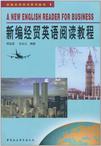新编经贸英语阅读教程
出版时间:1999-8 出版社:中国社会科学出版社 作者:周富强 页数:375
内容概要
《新编经贸英语系列教材1:新编经贸英语阅读教程》分十四个单元。每个单元包括A、B两篇课文、阅读材料、疑难词汇与词组、供思考讨论的问题及注释。课文对国际经济贸易各科理论、实践及其历史沿革和目前发展趋势作出系统的概述;阅读材料展示经贸理论热点;词汇与词组部分就超出大纲的生词及词组和专业术语作出了详细的解释以帮助读者快速理解课文内容;课后讨论问题从不同角度就课文相关内容提出问题以引导读者对所读理论知识作系统深入的思考并运用所学理论分析实际问题;注释就课文相关的理论知识给以较全面的展现,以加深读者对所学知识的理解,进而扩大读者的知识面。
书籍目录
Unit OneInternational Trade (1)Text A International TradeText B The European UnionUnit TwoEconomics (25)Text A EconomicsText B National EconomyUnit ThreeManagement (53)Text A Overview of Business ManagementText B CorporationUnit FourMarketing (94)Text A International MarketingText B AdvertisingUnit FiveFinancial Management (129)Text A International BankingText B International CreditUnit SixInsurance & Arbitration (159)Text A InsuranceText B ArbitrationUnit Seven Accounting & Statistics (194)Text A AccountingText B StatisticsUnit Eight Taxation & Budget (217)Text A TaxationText B BudgetUnit NineInformation Technology (245)Text A Computer ScienceText B InternetUnit TenIntellectual Property (277)Text A Intellectual PropertyText B CopyrightUnit ElevenThe International Legal Environments (290)Text A Fundamentals of LawText B Civil LawUnit Twelve International Human Resources Management (307)Text A International Human Resources ManagementText B HRM in International Management DevelolmentUnit ThirteenInternational Investment &Technology Transfer (330)Text A Direct Foreign InvestmentText B International Technology TransferUnit Fourteen Trade in Services (361)Text A General Introduction to Trade in ServicesText B GATS: The Uruguay Round Accord on International Trade and Investment in Services
章节摘录
International trade enables countries to use their labor, capital, and other resources in the mostproductive manner possible. In this way they can enjoy a larger quantity and variety of goodsthan if they did not trade with one another. The classical model of economics, however, holdsthat to realize the greatest possible gains from international specialization and trade, industriesmust be competitive and workers able to enter or leave occupations without difficulty, andgovernment policies must encourage efficiency and promote competition. The tendency of countries to specialize in the production and export of things they canproduce best and relatively cheaply is called by economists, the principle of comparativeadvantage. According to it, countries specialize in some products and not in others because ofdifferences in their national factor endowments and technological capabilities. Factor Endowments A country's factor endowments include its stocks of physical capital, human capital, andnatural resources. Physical capital consists of machinery, factories, highways, railways,harbors, and other equipment and facilities used in production. Human capital representsinvestment in the labor and management force through education, on-the-job training, andwork experience. To understand what determines the kinds of products that a nation exports orimports: a first step is to compare its factor endowments with those elsewhere. Japan, forexample, is relatively abundant in physicF1 and human capital but deficient in agricultural landand other natural resources. It thereforesells manufactured goods and machinery abroad inorder to pay for its imports of agricultural products and raw materials. ……
图书封面
评论、评分、阅读与下载
用户评论 (总计0条)
推荐图书
- 麻辣教师鬼爆搭档
- Marketing Management 12th ed.营销管理
- Supply Chain Management: Strategy, Planning, and Operation (平装)
- 高雄電影紀事
- 旅游资源与开发
- 药学概论
- 金版高效速练 高一物理(下)
- 八年级物理下
- 英才考评.语文 人教课标版.三年级上
- 金版高效速练 高一语文(下)
- 45分钟政治高三全一册
- 英语
- 数学(8下RJ)
- 英才考评 语文 人教课标版 二年级上
- 英才考评 数学 人教课标版 三年级上
- 21世纪创新课堂 高二政治
- 21世纪创新课堂高二地理
- 高考政治抢分王(适用人教大纲版) (其他)
- 高考生物抢分王(适用人教大纲版) (其他)
- 高考历史抢分王(适用人教大纲版) (其他)
- 高考地理抢分王(适用人教大纲版) (其他)
- 0-3岁婴幼儿亲子游戏天地
- 青春舞台
- 思维方式
- 化学 九年级(上) 配人教版RJHX/教材完全学案(2011年5月印刷)/附单元测试卷)(上)
